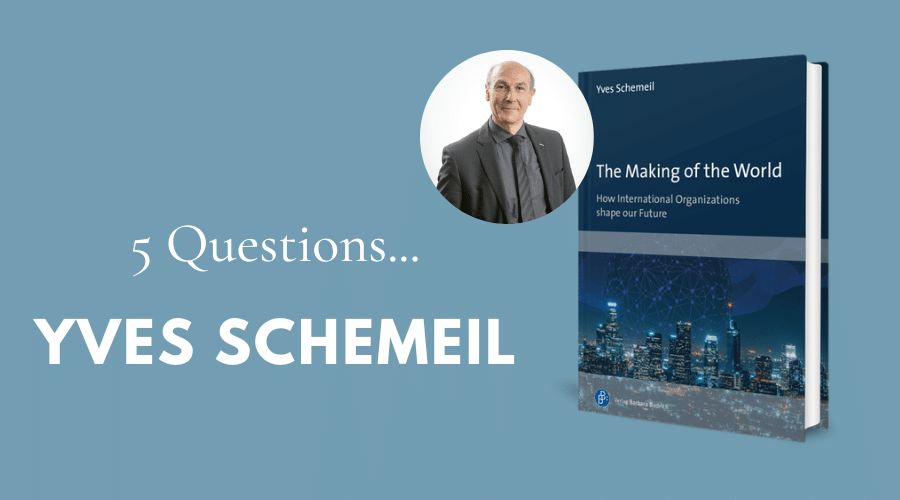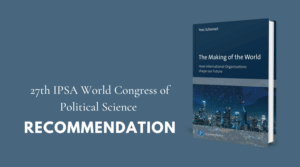About the book
International Organizations (IOs) were designed to provide global public goods, among which security for all, trade for the richest, and development for the poorest. Their very existence is now a promise of success for the cooperative turn in international relations. Although the IO network was once created by established powers, rising states can hardly resist the massive production of norms that their governments can be reluctant to respect without being able to discard them. IOs are omnipresent, and exert great influence on the world as we know it. However, rulers and ruled are hardly aware of such compelling and snowballing processes. Yves Schemeil uses his in-depth knowledge of IOs to analyze their current impact on international relations, on world politics, and their potential of shaping the global future.
Dear Yves Schemeil, in the introduction of “The Making of the World” you state that International Organizations (IO) are omnipresent and exert great influence on the world as we know it. Could you give us a brief overview of the questions you address in your publication?
Rather than studying the UN and other security bodies as is usual among specialists of international studies I focus on the most specialized organizations, those that deal with our basic needs and frame our daily behaviour. In my view, IOs and not governments are the major agents of global change. Their cooperation matters more than interstate collaboration. In my book, organizations are viewed from the inside and not from the outside; they are not considered as ancillary institutions to their member states whose decision-making bodies are often taken as black boxes but autonomous and increasingly transparent institutions. Among themselves, they tend to build networks of cooperation, which are more autonomous, more effective, and more socially useful than single organizations or isolated states.
How did the idea for this publication develop?
When I first visited the WTO, the World Meteorological Organization, and the IAEA, I was surprised by the intensity of their internal activities, the sophistication of their experts, and their ability to solve quasi-intractable issues through smart negotiation processes with very few resources. This was not at all consistent with the literature on bureaucratic inefficiency, waste of means, loss of time, etc. Moreover, these organizations have invented new management tools, in line with the concerns of our time – like social, environmental, and climatic responsibility. Nonetheless, people I interviewed gently denied that they had invented new organizational processes and achieved ambitious goals, not to speak of scholars who consider them as powerless and obsolete. This enigma deserved to be solved!
Your book is based on in-depth knowledge of dozens of organizations that you or student teams have observed thoroughly. What makes for successful organizations?
Success depends on a capability to facilitate trade-offs between rival national governments, as well as NGO activists pursuing contradictory goals, bureaucrats and diplomats’ diverging interests, headquarter people and agents on the ground, etc. It is also conditioned to entering a network in which they can pool resources and skills without losing their identity. Remaining faithful to their origins can be traced to their particular genesis decades if not centuries ago. Keeping this history alive boosts their legitimacy. This is welcome, when expansion and even survival are conditioned to an inevitable enhancement of their perimeter of activity, which may blur their original image. Finally, they create new norms, which become rules (like gender mainstreaming or mitigation of climate change) to which no one can resist in the long run.
What are the biggest threats to IOs? What dangers do authoritarian states and leaders pose to them?
Lack of financial resources! Most are poorly endowed, and the financial contributions of donors are often insufficient, tightly earmarked, or excessively lagging behind schedule. However, human and material resources depending on governments (detached agents, security staffs, accommodation and housekeeping, etc.) partly compensate for this uncertainty. Additionally, uncontrolled and unaccepted overlaps open to revisionist states a real window of opportunity to criticize the most vulnerable organizations. They eventually risk being controlled by illiberal governments whose leaders do not recognize the primacy of their values while filling every position available at the top of the organizational chart as it had been designed after 1945.
This is why I have chosen Barbara Budrich as my publishing partner:
The preliminary discussions I held with the publisher were the most fruitful of the contacts I had, compared to my pevious experience. Barbara Budrich is really committed to disseminating sound knowledge, without putting too much pressure on her authors.
About Yves Schemeil
 Currently: Emeritus Professor of Political Science, Sciences Po, University Grenoble-Alps (Sciences Po, University Grenoble-Alps) ; Professor of International Relations (Global and Comparative Politics, Institut universitaire de France).
Currently: Emeritus Professor of Political Science, Sciences Po, University Grenoble-Alps (Sciences Po, University Grenoble-Alps) ; Professor of International Relations (Global and Comparative Politics, Institut universitaire de France).
Previously: Professor, Sciences Po Paris, Sciences Po Aix-en-Provence.
Visiting Professor: Grenoble School of Management (2013 to the present); UCLA (spring term, 1980); Berkeley (summer session, 1985); the University of Chicago, October-November 1990 (Fulbright scholar); the American University of Paris (2d semester, 2005); Waseda University, Tokyo, Japan, July-August 2006 ; the University of Sophia, Tokyo, (winter semester, 2008- 2009); The University of Geneva (2002 to 2012) Saint-Joseph University (Beirut, 1972 to1975; 2001 to 2019); Ecole Hoteliere de Lausanne (2017-2018) Keio University (Tokyo, Fall 2015 and February 2021; the University of Akita, Japan (Spring 2016); Sommet-Education, Glion-Les Roches (June-July 2020).
More about Yves Schemeil: www.yves-schemeil.sciencespo-grenoble.fr
Order now via our web shop (print + e-book)

The Making of the World. How International Organizations Shape Our Future
by Yves Schemeil

